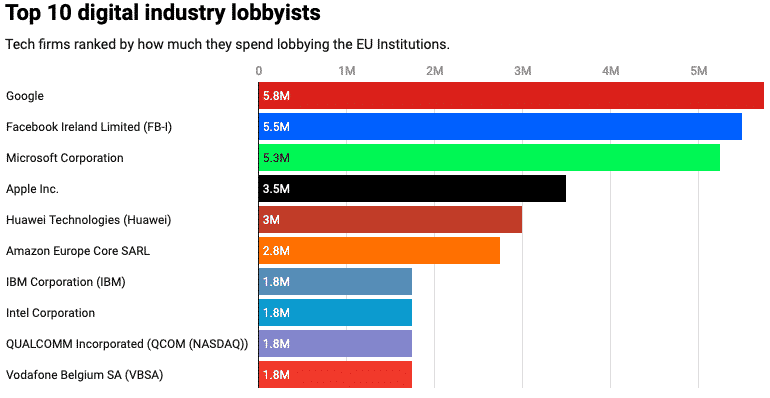The EU Commission is proposing tougher laws to better regulate and rein in the power of big tech companies. These laws include the Digital Markets Act (DMA) and the Digital Services Act (DSA). The laws will address disinformation, unfair competition practices, and targeted advertising done by big tech.
Big tech companies are the largest lobbying spenders against the EU’s new, more stringent laws. Google, Microsoft, Facebook and Apple were some of the biggest spenders, which is not a surprise due to their influence in the industry.
The tech sector now has more lobbying power than the automotive, pharmaceutical, and financial services industries. Their goal is to influence the EU Commission not to enforce policies that can hurt their power and influence over the market and consumers.
Tough Reform Proposals Impacting the Sector
The DMA and the DSA are a package of reform proposals intended to limit the power of big tech companies. The DSA aims to better protect online consumers. Tech companies will have to account for new reporting, auditing, and risk management for the content and advertisements that they produce and distribute.
The DMA aims to develop more fair and open digital markets to induce competition and regulate the conduct of “gatekeepers”. The goal is to improve antitrust enforcement, with additional rules that will impact digital services, apps, online marketplaces, and social media.
Additionally, tech giants are also trying to influence the EU’s enforcement of the General Data Protection Regulation (GDPR). The privacy and protection law sets guidelines for the collection of personal information for individuals living in the EU. Many argue that this policy was weakly applied to big tech. If implemented effectively, this law could hurt their business models.

Source: EU Transparency Register
Alt Text: Ten technology companies spend a third of total technology lobbying expenses
https://socialeurope.eu/how-big-tech-money-skews-the-european-playing-field
Big Tech Spending
Big tech companies are trying to influence the EU’s policy agenda. A recent study by the Corporate Europe Observatory and Lobby Control analyzed the power of tech lobbying spending at the EU level.
The report found that only ten companies are responsible for a third of tech lobbying spending, even though 612 companies are partaking in lobbying spending to influence the EU’s tech regulation policies. The companies include Google, Facebook, Microsoft, Apple, Vodafone, Qualcomm, Intel, Amazon, IBM, and Huawei. These ten companies contribute 32 million euros out of the total 97 million euros annually spent on lobbying the EU.
The power of US-based big tech companies was illustrated in the breakdown of lobbying spending. Google topped lobbying spending with 5.8 million euros, followed by Facebook and Microsoft. US-based firms dominated the industry in lobbying spending, while Chinese firms made up less than 1% of total lobbying spending.
Additionally, China has not invested as much in the EU lobby as the US. 20% of tech companies lobbying the EU are US-based, and less than 1% of companies lobbying the EU have headquarters in China or Hong Kong.
Big tech’s heavy spending has given them access to the EU Commission. Smaller firms, however, do not have this privilege. As a result of Big tech’s lobbying spending efforts, the EU commission of high-level officials held over 270 meetings in the last two years. Wealthy big tech can advocate for preferred policies with the appearance of industry-wide support even though big tech is making the majority of contributions.
Big Tech Funding
Big tech gets some of its funding for lobbying from startups, NGOs, and think tanks. These companies advocate on behalf of big tech. However, big tech companies often do not disclose the links between them and these companies unless they face pressure to do so.
The Bottom Line
Big tech giants have huge lobbying budgets intended to prevent EU institutions from imposing laws that can compromise their power. Lobbying spending in this sector has far exceeded spending in other sectors. A third of lobbying spending comes from ten tech companies. This indicates that most of the tech companies contribute little to the effort relative to big tech.
Big tech wants to maintain its influence in the digital market. Increased lobbying efforts came when EU institutions introduced new reform proposals such as the DSA and DMA. These reforms are designed to address unfair anti-competition by big tech and increase consumer protection. The implementation of these laws could threaten the power of big tech. Investors should consider the implications of these laws for CFD trading.
Big tech’s spending has a significant impact on EU policymakers. Big tech spends significantly more than other tech companies that are a part of the lobby. Their spending gives them access to high-level officials in the EU commission. Overall, US-based companies have contributed to this effort far more than Chinese tech companies.



 Bitcoin
Bitcoin  Ethereum
Ethereum  Tether
Tether  XRP
XRP  Solana
Solana  USDC
USDC  TRON
TRON  Lido Staked Ether
Lido Staked Ether  Cardano
Cardano  Avalanche
Avalanche  Toncoin
Toncoin